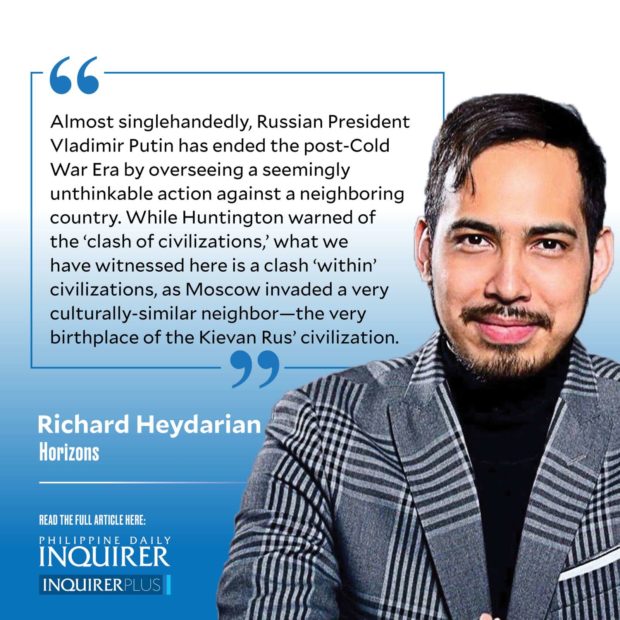PARIS — The 19th-century philosopher G.W.F. Hegel once famously argued that war is a “positive moment,” which “constitutes a form of purification” from the “corruption in nations” after “prolonged, let alone ‘perpetual’ peace.” Almost exactly two centuries later, a new war in Europe has galvanized the transatlantic alliance unlike anything since the end of World War II.
For almost exactly three decades, beginning from the Fall of the Berlin Wall in 1989 to the final year before the COVID-19 pandemic, an unprecedented era of peace and prosperity reigned across much of Europe. Only a handful of thinkers, however, foresaw this Elysium toward the end of the Soviet-American Cold War in the 20th century.
Perhaps most controversially, the Harvard political scientist Samuel Huntington predicted a global “clash of civilizations,” pitting an American-led West against China and the Muslim world. On his part, the late Polish-American US national security advisor Zbigniew Brzezinski foresaw conflict in absence of “the emergence of a truly post-imperial Russia that can assume its proper place in the concert of the world’s leading democratic nations.”
The most influential vision of the post-Cold War era, however, came from Huntington’s former doctoral student, Francis Fukuyama, whose “The End of History” thesis became an instant bestseller. First laid out in a 1989 essay for The National Interest magazine, Fukuyama argued that the impending collapse of the Soviet Union marked not only a geopolitical shift, but also the terminus of historical struggle over the best form of governance for human societies.
Heavily drawing on the works of Hegel, via the lectures of Russian émigré Alexandre Kojève, Fukuyama foresaw a new century, where the vast majority of governments would try or at least pretend to, replicate Western-style democratic capitalism. With the struggle over ideas over, a new era of Western hegemony would dawn upon humanity for the foreseeable future.
Only a few years later, however, he would modify his initial triumphalism by writing a full-length book, which, now also drawing on German philosopher Friedrich Nietzsche, developed a more somber prognosis. In particular, Fukuyama warned, “[e]xperience suggests that if men cannot struggle on behalf of a just cause because that just cause was victorious in an earlier generation, then they will struggle against the just cause.”
He warned of men (and women), who would “struggle for the sake of struggle” in a world of either restless boredom or nihilistic meaninglessness, or, even worse, contempt for “peaceful and prosperous liberal democracy.” Over the past week, the world awakened to the violent “struggle” of a powerful man, who seems determined to overturn the post-Cold War order in Europe.
Almost singlehandedly, Russian President Vladimir Putin has ended the post-Cold War Era by overseeing a seemingly unthinkable action against a neighboring country. While Huntington warned of the “clash of civilizations,” what we have witnessed here is a clash “within” civilizations, as Moscow invaded a very culturally-similar neighbor — the very birthplace of the Kievan Rus’ civilization.
As the world’s biggest land power invaded a far weaker neighbor, the world witnessed the hard edge of what can be described as “Gangsterpolitik,” namely the threat (or actual) deployment of overwhelming coercive force to achieve specific strategic objectives.
The upshot, however, is nothing short of a new world disorder, whereby all the preexisting norms and laws governing interstate relations have almost collapsed overnight. The current crisis has set perilous precedence, which may motivate other major powers, especially China, to also contemplate similar aggressive moves in their own respective neighborhoods.
In fact, even Europeans have come to recognize the growing threat posed by China. As German Foreign Minister Annalena Baerbock told me during an exchange at the Munich Security Conference earlier this month, “As a new government we’ve made pretty clear that China is not only a partner … but also is a systematic rival.”
In Paris, Asia expert Frédéric Grare also maintained that the Macron administration is determined to avoid “new hegemony” in Asia, and that “France also ha[s] military capacities and would make use of them if necessary” to ensure “reciprocity” and “a level playing field” in the Indo-Pacific and beyond. In short, the ongoing crisis in Europe has galvanized the West unlike any time in recent memory amid major threats from rival powers.


